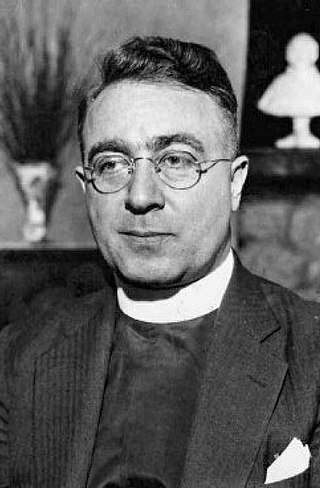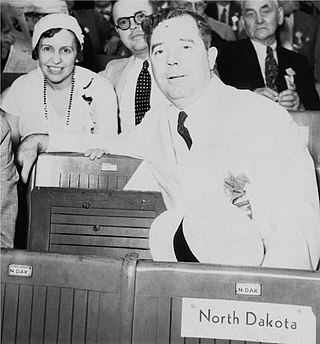
The 1936 United States presidential election was the 38th quadrennial presidential election, held on Tuesday, November 3, 1936. In the midst of the Great Depression, incumbent Democratic President Franklin D. Roosevelt defeated Republican governor Alf Landon of Kansas in a landslide victory. Roosevelt won the highest share of the popular vote (60.8%) and the electoral vote since the largely uncontested 1820 election. The sweeping victory consolidated the New Deal Coalition in control of the Fifth Party System.

Huey Pierce Long Jr., nicknamed "The Kingfish", was an American politician who served as the 40th governor of Louisiana from 1928 to 1932 and as a United States senator from 1932 until his assassination in 1935. He was a left-wing populist member of the Democratic Party and rose to national prominence during the Great Depression for his vocal criticism of President Franklin D. Roosevelt and his New Deal, which Long deemed insufficiently radical. As the political leader of Louisiana, he commanded wide networks of supporters and often took forceful action. A controversial figure, Long is celebrated as a populist champion of the poor or, conversely, denounced as a fascist demagogue.

William Clark Styron Jr. was an American novelist and essayist who won major literary awards for his work.

Charles Edward Coughlin, commonly known as Father Coughlin, was a Canadian-American Catholic priest based in the United States near Detroit. He was the founding priest of the National Shrine of the Little Flower. Dubbed "The Radio Priest " and considered a leading demagogue, he was one of the first political leaders to use radio to reach a mass audience. During the 1930s, when the U.S. population was about 120 million, an estimated 30 million listeners tuned to his weekly broadcasts.

Share Our Wealth was a movement that began in February 1934, during the Great Depression, by Huey Long, a governor and later United States Senator from Louisiana. Long first proposed the plan in a national radio address, which is now referred to as the "Share Our Wealth Speech". To stimulate the economy, the Share Our Wealth program called for massive federal spending, a wealth tax, and wealth redistribution. These proposals drew wide support, with millions joining local Share Our Wealth clubs. Roosevelt adopted many of these proposals in the Second New Deal.
The Union Party was a short-lived political party in the United States, formed in 1935 by a coalition of radio priest Father Charles Coughlin, old-age pension advocate Francis Townsend, and Gerald L. K. Smith, who had taken control of Huey Long's Share Our Wealth (SOW) movement after Long's assassination in 1935. Each of those people hoped to channel their wide followings into support for the Union Party, which proposed a populist alternative to the New Deal reforms of Franklin D. Roosevelt during the Great Depression.

Hugh Anthony Cregg III, known professionally as Huey Lewis, is an American singer, songwriter and actor.
Alan Brinkley was an American political historian who taught for over 20 years at Columbia University. He was the Allan Nevins Professor of History until his death. From 2003 to 2009, he was University Provost.

The 1928 Louisiana gubernatorial election was held on April 17, 1928. Like in most Southern states between the Reconstruction era and the civil rights movement, Louisiana's Republican Party was virtually nonexistent in terms of electoral support. This meant that the Democratic primary held on January 17 was essentially the real contest to decide the governor, as winning the Democratic nomination would be tantamount to election as governor.
The National Union for Social Justice (NUSJ) was a United States political movement formed in 1934 by Charles Coughlin, a Catholic priest and radio host. It heavily criticized communism, capitalism, and the administration of Franklin D. Roosevelt, while also advocating for the nationalization of utilities and banks. The organization dissolved in 1937 after the political party it sponsored, the Union Party, drew less than two percent of the popular vote in the 1936 United States presidential election.

The first 100 days of the Franklin D. Roosevelt presidency began on March 4, 1933, the day Franklin D. Roosevelt was inaugurated as the 32nd president of the United States. He had signaled his intention to move with unprecedented speed to address the problems facing the nation in his inaugural address, declaring: "I am prepared under my constitutional duty to recommend the measures that a stricken nation in the midst of a stricken world may require." Roosevelt's specific priorities at the outset of his presidency were getting Americans back to work, protecting their savings and creating prosperity, providing relief for the sick and elderly, and getting industry and agriculture back on their feet.

The 1936 United States presidential election in North Dakota took place on November 3, 1936, as part of the 1936 United States presidential election. Voters chose four representatives, or electors to the Electoral College, who voted for president and vice president.

On September 8, 1935, Huey Long, a United States senator and former Louisiana governor, was fatally shot at the Louisiana State Capitol in Baton Rouge, Louisiana. Long was an extremely popular and influential politician at the time, and his death eliminated a possible 1936 presidential bid against Franklin D. Roosevelt.

Every Man a King (1933) is an autobiography by Huey Long, who served as the 40th governor of Louisiana and as a member of the United States Senate. Aged 39 at the time, Long would be assassinated two years later. The book explores Long's rise to power. Long's posthumously published My First Days in the White House is sometimes referred to as his "second autobiography".

The political views of Huey P. Long have often challenged historians and biographers. While most say that Louisiana Governor and Senator Huey Long was a populist, little else can be agreed on. Huey Long's opponents, both during his life and after, often drew connections between him and his ideology and far-left and right political movements, comparing his ideology to various movements such as European Fascism, Stalinism, and McCarthyism. When asked about his own political personality, Long simply replied: "Oh, hell, say that I’m sui generis and let it go at that." Writer Robert Penn Warren said "my guess is he was a remarkable set of contradictions."
"Every Man a King" is a song cowritten by Louisiana's Governor and United States Senator Huey Long and Castro Carazo. Long was known for his political slogan "Every man a king," which is also the title of his 1933 autobiography and the catch-phrase of his Share Our Wealth proposal during the Great Depression. The song's lyrics include the lines "With castles and clothing and food for all/ All belongs to you". The song was co-written in 1935 by Huey Long and Castro Carazo, the band director of Louisiana State University, a former orchestra leader at the Roosevelt Hotel in New Orleans brought to LSU by Long himself.

Huey Long, the former governor of Louisiana, served in the United States Senate from 1932 until his assassination in 1935. A powerful figure, Long was integral in Franklin Roosevelt's 1932 Democratic Nomination and the election of the first woman, Hattie Caraway, to the US Senate. He was investigated for election discrepancies regarding the election of his friend John H. Overton, but no evidence of fraud was found. He proposed sweeping legislation, known as the Share Our Wealth plan, to end the Great Depression. Long often used filibusters to prevent or slow the passage of New Deal legislation.
Huey Long, governor of Louisiana and US Senator, has inspired or been portrayed in numerous cultural works. He has served as the template for fascistic politicians in novels like It Can't Happen Here (1935), A Lion Is in the Streets (1945), and All the King's Men (1946). The latter two were adapted into Oscar-winning films.
Huey Long (1969) is a biography of Louisiana Governor and US Senator Huey Long written by historian T. Harry Williams. The work was well received, winning a Pulitzer Prize and a National Book Award.












